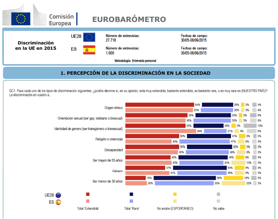The Eurobarometer on Discrimination 2015 confirms the strong presence of anti-Gypsyism in the EU. [editar]

European Commission published a new special Eurobarometer on Discrimination in the EU, an opinion survey conducted every three years. Based on 28,000 surveys in the 28 Member States, this year's data shed worrying data on discriminatory attitudes of European towards certain ethnic, religious and sexual minorities.
This macro survey confirms what was already known for some time as a serious problem: the strong rejection of an important part of Europe's population towards the Roma community, who, along with the Muslim community is the most discriminated social group.
These data must be clarified by country; for example, in the Spanish case the rejection of the Roma population is much lower than the European average. For example, when asked if they "feel comfortable to have a colleague Roma, 81% of the respondents in Spain manifest feel comfortable, or indifferent. However, the European average shows that only 54% would be comfortable.
Countries that show a greater rejection of Roma in the workplace are the Czech Republic (only 29% comfortable or indifferent), Italy (37%), Slovakia (41%) and Bulgaria (43%).
Another question that confirms antigypsysm is raising among European citizens arised when asking if they would be comfortable "if your son or daughter to have a loving relationship with a Roma". Only 45% would feel comfortable in this situation. In Spain 60% would feel comfortable, which shows a little less of rejection than the European average towards Roma community, but still a worrying statistic. The most extreme cases are found in the Czech Republic (only 11% would feel comfortable / a) and Bulgaria (13%).
The survey also reveals that there is little trust in the efficacy of the legal and institutional mechanisms to combat discrimination and protect the victims. Only 27% of the surveyed believes that efforts in this direction have been useful (Spain also has the same percentage), and 26% say they have been for nothing (28% in Spain). A majority of Europeans considered that efforts should be increased in combating discrimination (62%), a percentage that rises to 75% for Spanish respondents.
The report also notes an increase in anti-Semitism and Islamophobia in Europe, and negative attitudes towards transsexuals.
From the FSG, we value data of the survey, as it provides us two clear signals to continue the work in the fight against discrimination: first, it is necessary to sensitize the society and, secondly, to establish legal and defense mechanisms for victims . The data evidence the serious problem we have in the response currently being offered to the fight against discrimination of Roma. Therefore, we have to propose and advance the application and legislative development, support mechanisms and social awareness.


